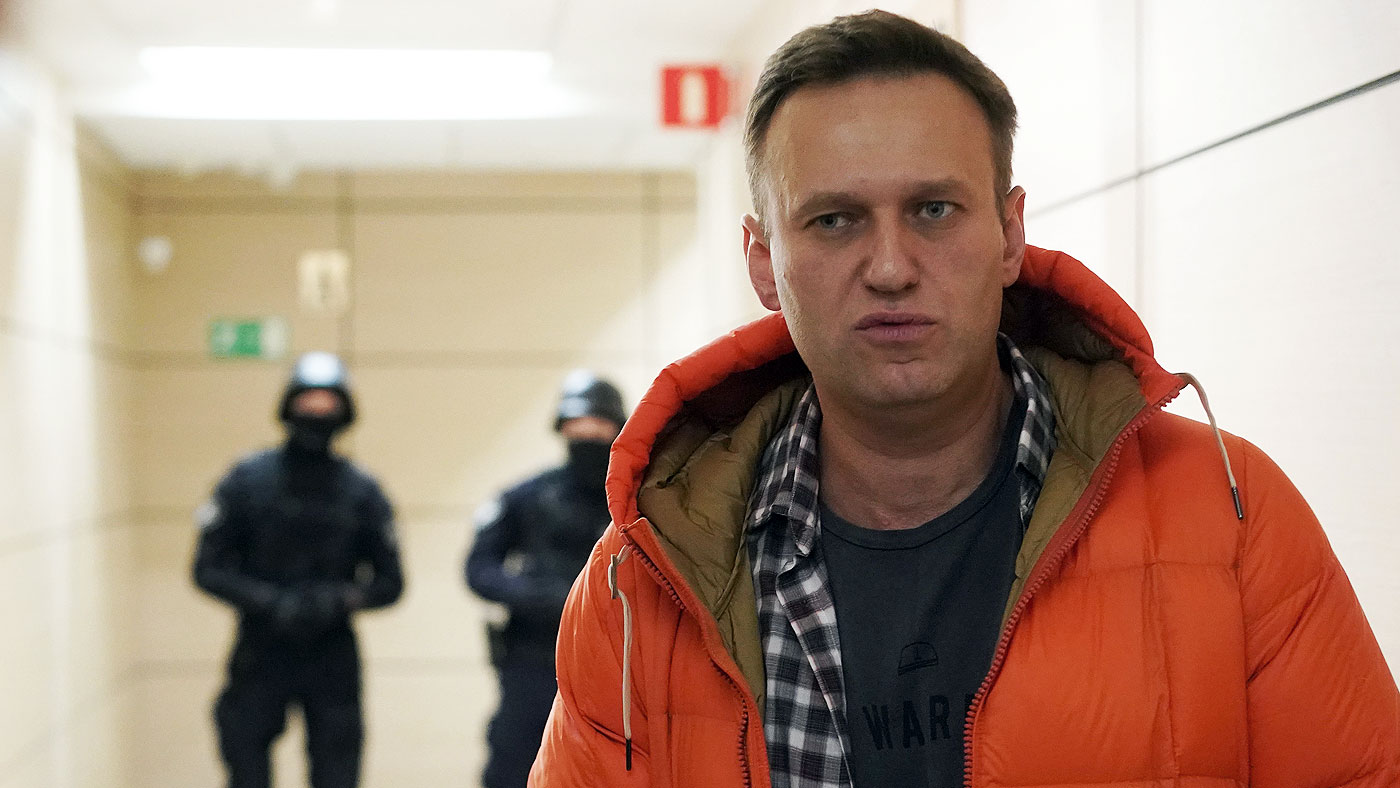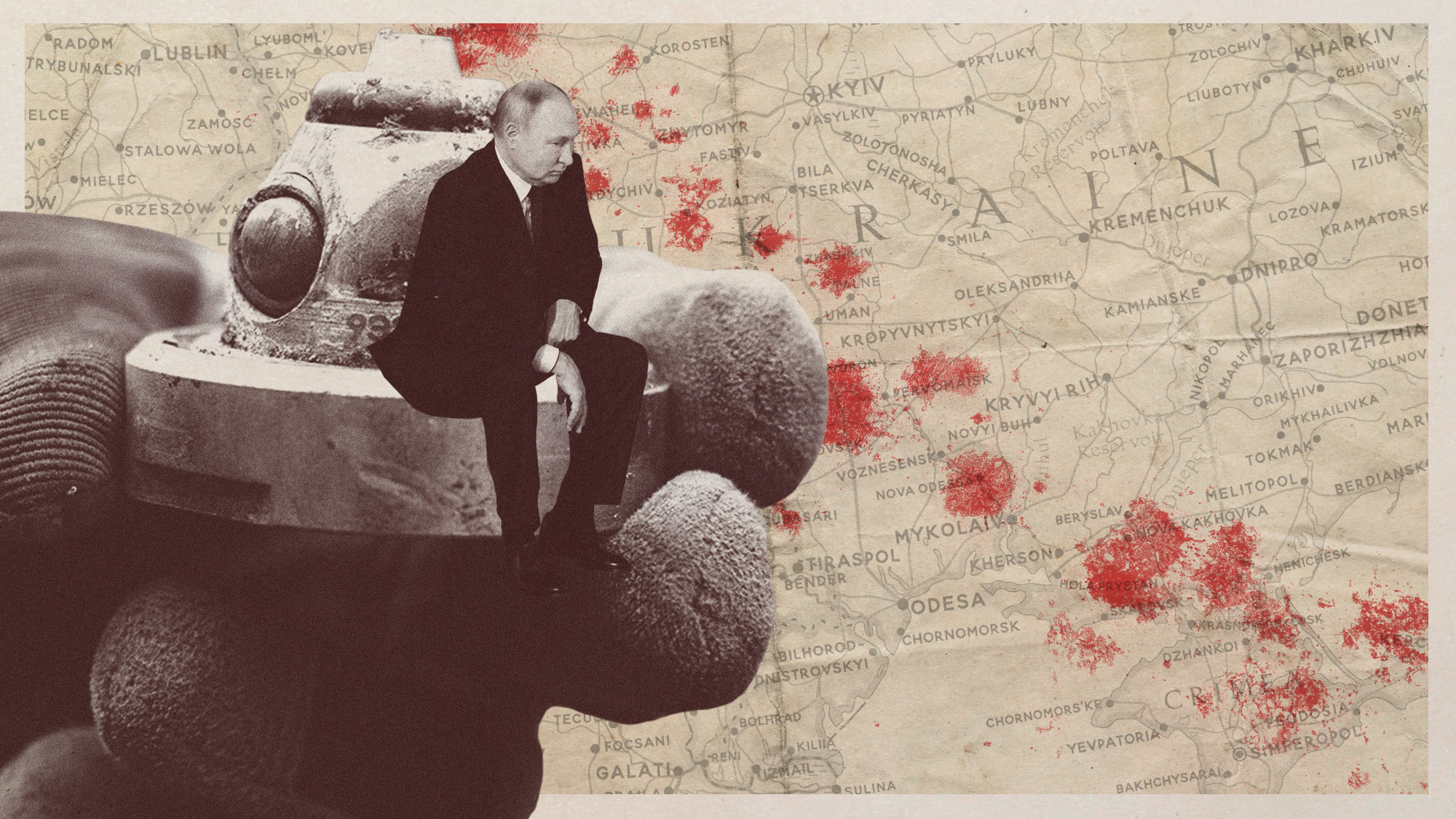Alexei Navalny: ‘the man Putin couldn’t kill’ faces nine more years in jail
Russian court finds Putin critic guilty of fraud

A free daily email with the biggest news stories of the day – and the best features from TheWeek.com
You are now subscribed
Your newsletter sign-up was successful
Vladimir Putin’s fiercest domestic critic Alexei Navalny has been found guilty of fraud and faces a further nine years in jail.
A court in Pokrov, east of Moscow, where Navalny is being held, convicted him over allegations that he stole from his own Anti-Corruption Foundation, as well as on a charge of contempt of court. The BBC said a “visibly gaunt” Navalny “folded his arms and exchanged comments with his lawyer” as the ruling was read out.
Navalny was sentenced last year to three and a half years in a penal colony for breaking bail conditions. Now a judge has sentenced him to nine years behind bars.
The Week
Escape your echo chamber. Get the facts behind the news, plus analysis from multiple perspectives.

Sign up for The Week's Free Newsletters
From our morning news briefing to a weekly Good News Newsletter, get the best of The Week delivered directly to your inbox.
From our morning news briefing to a weekly Good News Newsletter, get the best of The Week delivered directly to your inbox.
Who is Navalny?
Alexei Navalny has “long been the most prominent face of Russian opposition to President Vladimir Putin,” said the BBC.
Born on 4 June 1976 in Butyn, a village just west of Moscow, Navalny grew up in Obninsk and graduated with a law degree from Moscow’s Friendship of the Peoples University in 1998.
He rose to prominence in 2008 when he began writing blogs about alleged corruption at some of Russia’s largest state-controlled corporations, said Al Jazeera.
A free daily email with the biggest news stories of the day – and the best features from TheWeek.com
Ahead of the 2011 parliamentary election, Navalny advised his followers to vote for any party except Putin’s United Russia, which he called the “party of crooks and thieves”.
He then rallied anti-Putin protests and in 2015 served a 15-day prison sentence for distributing leaflets for an opposition rally on the subway.
In 2011 Navalny had founded an anti-corruption foundation called FBK. It sought to embarrass Putin’s United Russia party and last summer published a viral video claiming that the president’s rich associates gave him a luxurious Black Sea palace.
He has never been far from controversy and was dubbed “the man Putin couldn’t kill” by a BBC documentary. But some liberals have been “alarmed by Navalny’s early flirtation with the far right”, said Time magazine. They cited videos he put out in 2007 calling for the deportation of migrants, and comparing Islamist militants to cockroaches.
Where is he now?
Navalny was detained when he returned to Russia in January 2021 after months of treatment in Germany for a near-fatal Novichok nerve agent attack on him, which he blames on the Kremlin.
According to reports, an undercover hit squad working for Russia’s FSB spy agency poisoned Navalny on an internal flight in Siberia, having followed him for years.
The following month he was jailed for three and a half years for violating the conditions of a suspended sentence in an embezzlement case. Navalny insists the charges were politically motivated.
He is currently thought to be held at a prison colony 60 miles east of Moscow. IK-2 is a corrective labour colony near the town of Pokrov. It is known for its strict rules and harsh punishments.
Last year he reported, through his lawyers, that he was denied medical help for various health issues. He started a hunger strike that lasted 24 days, ending on 23 April 2021.
When he spoke in court last week he was wearing his black prison uniform. Journalists watching via video link said the transmission constantly cut out during his final speech.
What next for Navalny?
The prosecutor, Nadezhda Tikhonova, had last week called for a longer sentence for Navalny. “I request that Navalny be sentenced to a term of 13 years and a subsequent two years of probation,” said Tikhonova, according to Russian news agencies.
The prosecutor also asked for Navalny to be sent to a “strict regime” penal colony, which, said The Guardian, would find him facing much harsher conditions on a daily basis.
However, Navalny remained his defiant self during the hearing. “You can’t put everyone in prison. Even if you ask for 113 years, you won’t scare me or others like me,” he told the court.
He has also condemned Russia’s intervention in Ukraine, saying it was “the duty of every person” to oppose it.
Navalny’s aides and supporters, who insist he is innocent, said that Russia is seeking to keep Navalny jailed for life. “He was sentenced to life from the very start. So long as Putin is still in the Kremlin,” one wrote on Twitter.
Following his arrest, his political groups were declared “extremist” and shut down, while many key aides fled Russia. The authorities will hope that a longer sentence for Navalny will weaken the movement still further.
-
 Quentin Deranque: a student’s death energizes the French far right
Quentin Deranque: a student’s death energizes the French far rightIN THE SPOTLIGHT Reactions to the violent killing of an ultra-conservative activist offer a glimpse at the culture wars roiling France ahead of next year’s elections.
-
 Secured vs. unsecured loans: how do they differ and which is better?
Secured vs. unsecured loans: how do they differ and which is better?the explainer They are distinguished by the level of risk and the inclusion of collateral
-
 ‘States that set ambitious climate targets are already feeling the tension’
‘States that set ambitious climate targets are already feeling the tension’Instant Opinion Opinion, comment and editorials of the day
-
 New START: the final US-Russia nuclear treaty about to expire
New START: the final US-Russia nuclear treaty about to expireThe Explainer The last agreement between Washington and Moscow expires within weeks
-
 What would a UK deployment to Ukraine look like?
What would a UK deployment to Ukraine look like?Today's Big Question Security agreement commits British and French forces in event of ceasefire
-
 Trump peace deal: an offer Zelenskyy can’t refuse?
Trump peace deal: an offer Zelenskyy can’t refuse?Today’s Big Question ‘Unpalatable’ US plan may strengthen embattled Ukrainian president at home
-
 Vladimir Putin’s ‘nuclear tsunami’ missile
Vladimir Putin’s ‘nuclear tsunami’ missileThe Explainer Russian president has boasted that there is no way to intercept the new weapon
-
 How should Nato respond to Putin’s incursions?
How should Nato respond to Putin’s incursions?Today’s big question Russia has breached Nato airspace regularly this month, and nations are primed to respond
-
 Russia’s war games and the threat to Nato
Russia’s war games and the threat to NatoIn depth Incursion into Poland and Zapad 2025 exercises seen as a test for Europe
-
 What will bring Vladimir Putin to the negotiating table?
What will bring Vladimir Putin to the negotiating table?Today’s Big Question With diplomatic efforts stalling, the US and EU turn again to sanctions as Russian drone strikes on Poland risk dramatically escalating conflict
-
 Ottawa Treaty: why are Russia's neighbours leaving anti-landmine agreement?
Ottawa Treaty: why are Russia's neighbours leaving anti-landmine agreement?Today's Big Question Ukraine to follow Poland, Finland, Lithuania, Latvia and Estonia as Nato looks to build a new ‘Iron Curtain' of millions of landmines